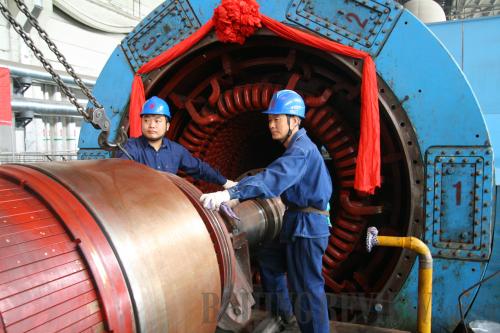|
 |
|
POLICY SHIFT: Hebei Matou Electricity Plant has shut down its four small thermal power units, which are inefficient and highly polluting (XINHUA) |
The year 2004 witnessed an extremely prosperous steel industry. Soaring steel prices and huge profits had attracted many investors to contribute to the creation of new factories.
One of those visionaries was Zhang Qiaosheng, a manager of the Changfeng Special Steel Co. in Shanxi Province. He decided to build a new steel production line with a capacity of 200,000 tons per year in 2005, hoping to reap rewards from the booming sector.
But with iron ore prices rising sharply in 2005 and the introduction of tightened policies by the government, the rosy picture for the steel industry began to turn a little gloomy.
"The year 2005 was still a prime time for the steel industry, but in 2006, we began to feel the effects of overproduction and, as a result, the pressure of lower prices," Zhang said.
With total investment amounting to 100 million yuan ($14.7 million), the production line of Zhang's company hardly turned in a profit after its establishment.
The final blow
On August 8, the investment hit a final, insurmountable hurdle. China's Ministry of Industry and Information Technology (MIIT) issued an order requiring 2,087 companies in 18 sectors to shut down their outdated, "backward" production lines by the end of September. The order's purpose was two-fold: it is hoped the move will help correct an overcapacity problem that continues to plague Chinese industries and, more importantly, it will help China meet its commitments to reducing greenhouse emissions.
While deemed necessary by most observers, the MIIT order deals a heavy blow to the companies involved. On August 9, a frustrated Zhang told Daily Business News that his company had shut down its 200,000 tons/year production line, one of those named in the order. "We will definitely be more cautious in future to avoid such huge losses brought about by the 'investment fever' [that took hold] in one sector," he said.
Excessive production capacity is a common phenomenon among China's many industries. Production in those sectors is usually typified by high consumption of energy and resources.
In 2005, the Chinese Government pledged in its 11th Five-Year Plan (a guideline to direct the nation's economic and social development from 2006-10) to reduce its energy consumption per unit of GDP by 20 percent by the end of 2010. Since then, a series of policies and measures aimed at reducing pollution and energy consumption have been introduced.
However, China still faces severe problems, including excessive and outdated production capacity among different industries, which constitute a major obstacle to achieving the target of a 20 percent cut to greenhouse emissions by 2010. Now, with only a few months left, the country is going all out to fulfill its commitment.
Li Yizhong, MIIT Minister, revealed that during the previous four years of the 11th Five-Year Plan, China managed to reduce its energy consumption per unit of GDP by 14.38 percent. However, the nation faces a major challenge in bringing that figure up to 20 percent by the end of this year, he added.
The possibility of missing the target has prompted a renewed "iron fist" approach from the Central Government, which has decided to cut out the deadwood from inefficient and highly polluting enterprises. MIIT's order is the clearest example of this.
Xie Zhenhua, Vice Minister of the National Development and Reform Commission (NDRC), said in a forum on August 18, "With only three months left to complete the 11th Five-Year Plan and emerging signs of rising energy consumption, an iron-fist crackdown on industry inefficiency and pollution is a must."
The labor pain
It's noteworthy that a considerable number of enterprises on the MIIT's order are small and medium-sized. Compared with their large and state-owned peers, they are much more vulnerable to policy changes. For example, Zhang Qiaosheng's company, besides suffering from the huge economic losses, has to sack 500-600 employees due to the closure. He Jun, a senior analyst with Anbound Consulting Co., pointed said many small steel enterprises will face huge pressure under this order. "Either they will be acquired by stronger players in the sector, or they must upgrade their production methods and improve efficiency," he said.
He's view is echoed by Li Zhisong, Director of the Industry Department of the Economic Committee in Shanxi Province. He noted that shutting down those small factories will definitely cause unemployment and shrinkage of local governments' fiscal revenue.
Softening the blow
Since 2006, the government has earmarked special funds for the pursuit of greenhouse emission cuts. According to Zhu Hong ren, MIIT spokesman, from 2007 to 2009 the Central Government allocated a total of 16.2 billion yuan ($2.4 billion) to subsidize relevant enterprises. Meanwhile, local governments raised more than 7 billion yuan ($1.03 billion) to support the effort. Zhu said that this year the Central Government will take out 4 billion yuan ($590 million) to help affected companies upgrade their production, resolve unemployment and optimize resources allocation. For instance, Taiyuan LionHead Co. received a 2.85 million yuan ($420,000) subsidy this year for closing an outdated cement production line with a capacity of 150,000 tons per year and removing two ineffective productions sites. Overall, most industry insiders hold the view that despite any unemployment pain suffered as a result of the overcapacity cut, a major wave of mergers and acquisitions will occur in relevant sectors, bringing investment opportunities and leading to a higher degree of industry concentration.
Indeed, temporary pain is inevitable, but authorities will be hoping the pain is worth it.
|